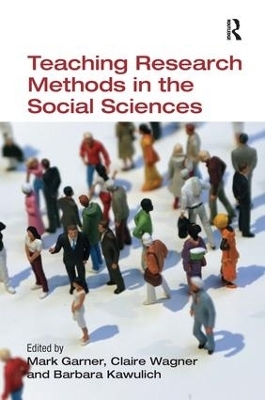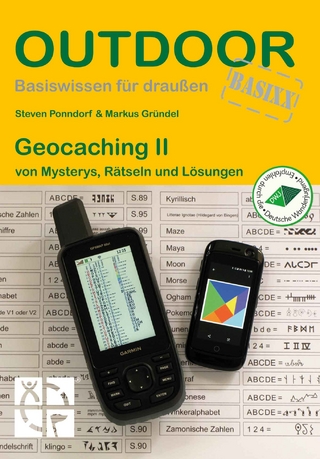
Teaching Research Methods in the Social Sciences
Routledge (Verlag)
978-0-7546-7352-1 (ISBN)
How can excellence in the teaching of research methods be encouraged and ensured? This question has become increasingly important following the adoption of research methodology as a core part of many postgraduate and undergraduate courses. There has, however, been little discussion about the aims and methods of teaching the subject. In this volume; a number of authors from a variety of countries and disciplines employ their knowledge and experience towards the development of a 'pedagogical culture' in research methods. Their aim is to establish the extent of common concerns and challenges and to demonstrate ways in which these are being met. Intended to provide both a stimulus and source materials for the development of a more substantial and systematic literature in the field, the book will be of great interest to all those teaching research methods courses within social science disciplines.
Mark Garner is Co-ordinator of Linguistics, School of Language and Literature, University of Aberdeen, UK. He was previously Programme Director for Applied Lingusitics at Northumbria University. He has also taught at the University of Melbourne and La Trobe University in Australia. Dr Claire Wagner is Lecturer in Psychology at the University of Pretoria, South Africa Dr Barbara Kawulich is Assistant Professor in Educational Leadership and Professional Studies at the University of West Georgia, USA
Contents: Introduction: towards a pedagogical culture in research methods, Mark Garner, Claire Wagner and Barbara Kawulich; Part I Historical Perspectives: Trends in teaching qualitative research: a 30-year perspective, Judith Preissle and Kathryn Roulston; Historical trends in teaching research methods in the United States, Blaine F. Peden and David W. Carroll. Part II Approaches to the Curriculum: The role of theory in research, Barbara Kawulich; Critical realism and teaching empirical methods, David J.F. Maree; Quantitative or qualitative: ontological and epistemological choices in research methods curricula, Claire Wagner and Chinedu Okeke; Ontology, epistemology, and methodology in teaching research methods, Jan Pascal and Grace Brown; Research as social relations: implications for teaching research methods, Mark Garner and Peter Sercombe; Incorporating the ethical dimension in the teaching of research methods, Donna McAuliffe. Part III Approaches to developing research competence: Developing reflective researchers, Mark A. Earley; Apprenticeship: induction to research through praxis of method, Wolff-Michael Roth; The (in)effectiveness of various approaches to teaching research methods, Terrell L. Strayhorn; Teaching the use of technology in research methods, João Batista Carvalho Nunes; Best practice in research methods assessment: opportunities to enhance student learning, Erica L. James, Bernadette M. Ward, Virginia A. Dickson-Swift, Sandra A. Kippen and Pamela C. Snow. Part IV Approaches to Teaching Particular Methods: Researcher, know thyself! Emerging pedagogies for participatory research, Peter Taylor; Teaching research methods to trainee practitioners, Tuyen D Nguyen and Brian T. Lam; How to do case study research, Donna M. Zucker; Symmetries ands asymmetries between curriculum and pedagogy in teaching critical ethnography, Shijuan Liu and Phil Francis Carspecken. Part V Approaches to Teaching Non-Traditional Students: Learning research together: reciprocal benefits for individuals with and without disabilities, Annabelle L. Grundy and Michelle K. McGinn; Bridging gaps: the quest for culturally responsive pedagogies in collaborative research methods, José Antonio Flores Farfán, Mark Garner and Barbara Kawulich; Afterword, Mark Garner, Claire Wagner and Barbara Kawulich; Bibliography; Index.
| Erscheint lt. Verlag | 28.8.2009 |
|---|---|
| Verlagsort | London |
| Sprache | englisch |
| Maße | 156 x 234 mm |
| Gewicht | 612 g |
| Themenwelt | Sachbuch/Ratgeber ► Gesundheit / Leben / Psychologie |
| Naturwissenschaften ► Geowissenschaften ► Geografie / Kartografie | |
| Recht / Steuern ► Allgemeines / Lexika | |
| Recht / Steuern ► EU / Internationales Recht | |
| Sozialwissenschaften ► Ethnologie | |
| Sozialwissenschaften ► Pädagogik ► Sozialpädagogik | |
| Sozialwissenschaften ► Politik / Verwaltung | |
| Sozialwissenschaften ► Soziologie | |
| ISBN-10 | 0-7546-7352-9 / 0754673529 |
| ISBN-13 | 978-0-7546-7352-1 / 9780754673521 |
| Zustand | Neuware |
| Haben Sie eine Frage zum Produkt? |
aus dem Bereich


